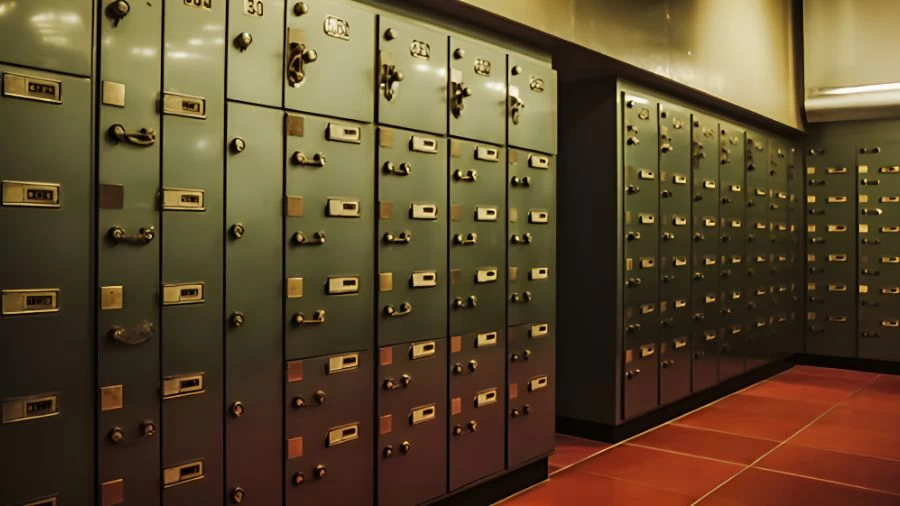
How Much Does a Safety Deposit Box Cost? What you should or shouldn’t store?
Safety deposit box costs vary, ranging from $15 to $150 annually, depending on size, location, and bank-specific factors.
by Sai V
Updated Sep 09, 2023
On This Page
- How Much Does a Safety Deposit Box Cost?
- What You Should Store in a Safe Deposit Box?
- What You Shouldn’t Store in a Safe Deposit Box?
- Why Use a Safe Deposit Box?
- What is a Safe Deposit Box?
- What Happens to a Safe Deposit Box's Contents When the Owner Dies?
- Can Others Access My Safety Deposit Box Without My Approval?
- How Do Safe Deposit Boxes Function?
- What Are the Pros and Cons of a Safe Deposit Box?
How Much Does a Safety Deposit Box Cost?
The cost of a safety deposit box can vary depending on several factors, including the size of the box, the financial institution you choose, and your location. On average, the annual fees for a safety deposit box range from as low as $15 to around $150. Larger boxes typically come with higher rental fees, often calculated based on a cost-per-square-inch rate.
For example, a 10-by-10-inch safety deposit box might cost approximately $100 per year if the bank charges $1 per square inch. However, these prices can fluctuate from one bank to another, and additional factors such as security features and insurance coverage may also impact the overall cost, so it's advisable to inquire with your specific bank for precise pricing information and options.
What You Should Store in a Safe Deposit Box?
When considering what to store in a safe deposit box, it's essential to choose items that benefit most from the secure environment offered by the bank. Here are some key guidelines for determining what items are suitable for safekeeping in a safe deposit box.
Important Documents:
One of the primary uses of a safe deposit box is to safeguard crucial documents. These may include:
- Legal Documents: Store items such as property deeds, wills, trusts, and power of attorney documents. Keeping these documents secure ensures they are protected from loss or damage.
- Financial Records: Store important financial records like insurance policies, stock certificates, and bonds. These documents can be challenging to replace and may be needed for legal or financial purposes.
- Personal Identification: Secure vital identification documents like passports, birth certificates, and Social Security cards. These items are essential for various transactions and should be kept in a safe location.
Valuable Items:
Safe deposit boxes are ideal for safeguarding valuable items that have both monetary and sentimental value, such as:
- Jewelry: Precious jewelry pieces, family heirlooms, and valuable gems can be safely stored in a secure environment to prevent loss or theft.
- Collectibles: Valuable collectibles like rare coins, stamps, or antique items should be protected in a safe deposit box to preserve their condition and value.
- Photographs: Irreplaceable family photos and important memories can be stored securely to shield them from deterioration due to time or environmental factors.
Irreplaceable Items:
Certain items are simply irreplaceable, making a safe deposit box an ideal choice for their protection, including:
- Irreplaceable Sentimental Items: These could be letters, mementos, or objects with deep sentimental value that you want to keep safe for future generations.
- Backup Data and Digital Storage: Secure external hard drives, USB drives, or physical backups of digital files to protect vital data from loss or damage due to accidents or disasters.
What You Shouldn’t Store in a Safe Deposit Box?
When it comes to using a safe deposit box for secure storage, there are certain items that you should avoid placing inside due to various reasons, including accessibility, safety, and practicality. Here are some key items and categories that you should refrain from storing in a safe deposit box:
Cash:
Storing cash in a safe deposit box is generally not recommended. Unlike bank accounts, the cash within the box isn't insured, and it doesn't earn any interest. Instead, opt for a savings account or a certificate of deposit (CD) where your money is both insured and potentially grows over time.
Emergency Essentials:
Safe deposit boxes are typically accessible only during the bank's business hours. Therefore, it's unwise to store items you might need in an emergency, such as important medications, legal documents, or tools. Keep these items in a readily accessible location at home or in a more convenient place.
Firearms and Hazardous Materials:
Most rental agreements for safe deposit boxes explicitly forbid storing firearms, explosives, hazardous chemicals, and illegal drugs. These items pose significant safety risks and legal issues if found within a safe deposit box.
Perishable or Fragile Items:
Avoid placing perishable goods or extremely fragile items in a safe deposit box. Items like food, plants, or highly delicate collectibles can deteriorate or get damaged due to the lack of appropriate storage conditions.
Uninsured Valuables:
While safe deposit boxes offer security, they do not insure the contents. If you have extremely valuable items like precious metals, jewelry, or rare artifacts, it's essential to consider separate insurance coverage to protect against loss or theft.
Why Use a Safe Deposit Box?
A safe deposit box offers unparalleled security and protection for your valuable items and important documents. Unlike keeping them at home, where risks of theft and loss exist, safe deposit boxes are housed within secure vaults with concrete or steel walls and robust vault doors. This level of physical security, along with protection from environmental hazards like fires, ensures the safety of your cherished belongings.
Furthermore, the confidentiality and privacy that come with using a safe deposit box make it an excellent choice for safeguarding sensitive information. To make the most of this secure option, it's crucial to choose a reputable financial institution, ask pertinent questions about their security measures, and periodically review the box's contents to ensure its contents align with your needs.
What is a Safe Deposit Box?
A Safe Deposit Box is a secure metal container typically offered by banks and credit unions for the safe storage of valuable items. These boxes are commonly kept within bank vaults and are available for rent to customers for a fee.
Despite some institutions phasing them out, Safe Deposit Boxes remain a trusted means for individuals to safeguard important documents and valuable possessions. In addition to traditional physical boxes, some financial institutions now provide virtual safe deposit boxes, allowing customers to securely store digital copies of crucial documents like birth certificates and wills, combining convenience with enhanced security.
What Happens to a Safe Deposit Box's Contents When the Owner Dies?
The fate of the contents within a safe deposit box upon the owner's demise hinges on a combination of state law and the rental agreement with the bank. In numerous states, surviving renters or co-renters typically retain rights of access to the box, simplifying the process.
However, when there's a sole renter or a lack of survivorship stipulations, the probate process may come into play, necessitating an attorney's involvement, often armed with the deceased's will, to locate and manage the box's contents, with a bank officer serving as a witness in some cases.
Given the potential complexities, individuals renting safe deposit boxes are advised to consult with legal professionals and ensure their wishes are clearly documented in their wills or legal documents to facilitate a smoother handling of the box's contents after their passing.
Can Others Access My Safety Deposit Box Without My Approval?
No, it is not possible for others to access your safety deposit box without your explicit approval. Only individuals whose names are officially listed on the safety deposit box lease have legal access to its contents. This ensures that third parties cannot gain entry to the box without proper authorization.
It is therefore vital to exercise caution in selecting who shares access to your safety deposit box, as the leaseholders are the only ones with the legal right to access it, and their access requires mutual agreement.
How Do Safe Deposit Boxes Function?
Safe deposit boxes serve as secure storage solutions offered by banks and financial institutions. Here's a breakdown of how these boxes function:
Access Control:
When you rent a safe deposit box, you receive a unique key or utilize a keyless access method such as fingerprint or hand scanning. In tandem with your key, there is a corresponding "guard key" held by a bank employee. Both keys or access methods are required for box access, enhancing security.
Identification Requirement:
Every time you visit the bank to access your safe deposit box, you must provide identification, typically a government-issued ID. If you have a physical key, it must also be presented during each visit, ensuring only authorized individuals can access the box.
Ownership and Co-Lessors:
Safe deposit boxes can be rented in your name only, or you can add other individuals to the lease. Co-lessors on a safe deposit box have equal access and rights to its contents. It's crucial to carefully select co-lessors, as certain issues like addiction, financial troubles, legal judgments, or marriage disputes can complicate matters.
Access Arrangements:
Some banks permit you to set up access arrangements that require all co-lessors to be present to open the safe deposit box. This added layer of security can prevent unauthorized access. Experts often recommend designating someone with power of attorney who can access the box in case of emergencies.
Items Suitable for Storage:
Safe deposit boxes are designed for storing valuable, irreplaceable, or confidential items. Common items to store include:
- Personal documents such as original birth certificates, marriage licenses, and citizenship papers.
- Copies of important legal documents like wills and powers of attorney (though not the sole copies).
- Military records and discharge papers.
- Academic records like school transcripts and diplomas.
- Sensitive documents you wish to keep confidential.
- Property-related documents, including house deeds and car titles.
- Paper stock and bond certificates (if not issued electronically).
- Home inventory lists for insurance purposes.
- Important business documents, contracts, and records.
- Data storage devices with critical backups.
- Valuable jewelry, collectibles, and cherished family heirlooms.
Size and Limitations:
Safe deposit boxes come in various sizes, but the largest ones are typically around 10 inches by 10 inches and two feet deep. It's important to select a box size that suits your storage needs.
Frequency of Access:
Safe deposit boxes are best suited for items you won't need to access frequently. They are not designed for items you may require on short notice.
What Are the Pros and Cons of a Safe Deposit Box?
Safe deposit boxes are secure storage options offered by banks, but they come with their own set of advantages and disadvantages. Let's explore these pros and cons in detail:
Pros of a Safe Deposit Box:
- Safe deposit boxes are typically located within bank vaults, providing a level of security that exceeds that of most homes. They are equipped with alarms, video cameras, and high-quality locks to deter unauthorized access.
- These boxes are designed to withstand various natural disasters, including fires, floods, hurricanes, tornadoes, and more. This makes them a secure option for safeguarding important items from unforeseen calamities.
- The contents of a safe deposit box are kept private and can only be accessed by the box holder or authorized individuals. This adds a layer of confidentiality that may be lacking at home.
- Safe deposit boxes are ideal for storing critical documents such as wills, medical directives, passports, and powers of attorney. They offer a secure environment, reducing the risk of loss or damage.
- Valuables, important documents, or sentimental items stored in a safe deposit box are less vulnerable to theft compared to keeping them at home.
Cons of a Safe Deposit Box:
- Safe deposit boxes can only be accessed during the operating hours of the bank. This limitation may not be suitable for situations requiring immediate access or during non-banking hours.
- Unlike bank deposits, the contents of a safe deposit box are not insured by the bank. You must rely on your personal insurance for coverage, which may lead to potential gaps in protection.
- Safe deposit boxes often come with rental fees, and these costs can accumulate over time. The financial aspect needs to be considered when deciding to use this storage option.
- The size of a safe deposit box is limited, making it unsuitable for larger items or a significant quantity of items. You may need to prioritize which items to store in the box.
- Failure to pay the rental fees for a safe deposit box or neglecting to inform your heirs about its location can lead to the contents being considered abandoned. This may result in the items being turned over to the state's unclaimed-property offices for auction.
- Bank policies and legal regulations dictate that certain items, such as cash or illegal materials, should not be stored in a safe deposit box. Violating these restrictions can lead to legal consequences.
How Much Does a Safety Deposit Box Cost? - FAQs
1. How much does it cost to rent a safety deposit box?
The annual cost of a safety deposit box ranges from $15 to $150, depending on size and location.
2. What items should I store in a safe deposit box?
Valuables like jewelry and important documents such as wills, passports, and financial records are suitable for safekeeping.
3. Can I store cash in a safe deposit box?
It's not recommended to store cash in a safe deposit box as it's not insured; consider a bank account for cash storage.
4. What happens to the contents of a safe deposit box when the owner passes away?
The fate depends on state law and rental agreements, but surviving renters typically retain access rights.
5. Who can access my safety deposit box?
Only individuals listed on the box's lease can access it, ensuring authorized access and mutual agreement among leaseholders.




